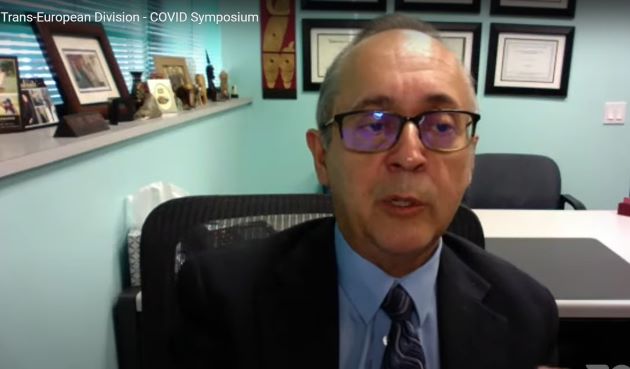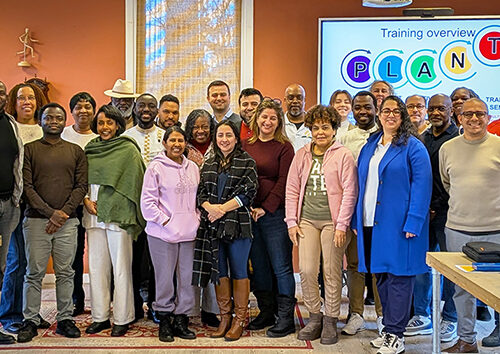21 January 2022 | St Albans, UK [David Neal]
The Trans-European Division (TED) hosted a COVID-19 symposium on 19th of January to address key concerns regarding the coronavirus pandemic, personal liberties, and the use of vaccines.
During the second part of the symposium the speakers, Ganoune Diop, PhD, Attorney Jennifer Woods, Dr Peter Landless, and Dr Carlos Casiano, spent approximately eighty minutes answering the questions of the viewers, submitted both before and during the symposium.

What follows is a summary of the panels’ discussion, you can watch the whole presentation here.
Have you done research on the ingredients of the vaccines and are you satisfied about the long-term safety of the COVID-19 vaccines?
There is little evidence, so far, of long-term effects of the components of the vaccine. There is a common fear that ingredients will alter the DNA. However, given the current vaccine ingredients, it is biologically impossible for them to get into the genetics.
The very same nano particles which concern some, are common elements used in everyday items such as spices, baking and sugared drinking sodas. Many cosmetics such as facial creams also contain traces of similar chemicals which are considered safe, and of little concern.
Are you aware of the claim that there are close to 600,000 people who have been injured by the vaccines and have reported it, but were dismissed and silenced?
To answer such a claim, a further question is required – what is the source of that number? And what is meant by ‘injuries’? Adverse effects to vaccines must be reported. So, does this figure include chills, fevers and pains in the arm, or are we talking about more serious effects? Is this number, 600,000, randomly found on the internet, or does it come from reliable medical/scientific source? Previously we shared the numbers of serious effects, mostly 1 in 20 million or in a 100 million, depending on the effect. The recorded scientific data shows that these are very low levels. So, we must be aware that there are a lot of figures circulating on the internet, but they do not have a reliable and scientific source.
How do we check the veracity of different claims?
The importance of a scientific claim is that it requires a wide peer-review component before being accepted. Why? Because it stands in contrast to ‘my experience’. In the development of the vaccine, rigid robust studies have been conducted. With 9.6 billion vaccines administered, it is not possible to hide significant and wide-spread adverse injuries. It is also no longer appropriate to call the vaccines ‘experimental’. Such widespread use provides for clear interpretation and insight. Beware of hyperbolic interpretation, as some statistics banded about have no firm foundation.
“Examine everything carefully…” (1 Thessalonians 5). Not everything on the internet is true. Be critical thinkers before making inferences. What is the premise of the claim? Do we want to be victim of conspiracy theories? In the post-truth world, it is even more important for us to be discerning thinkers.
People post on Facebook information which is taken as fact. If an individual has letters ‘Dr’ before their name, or ‘PhD’ after, we think they are a credible source. But that does not mean someone is an expert in the area of immunology and COVID-19. We have to be very careful about who we trust as our source of information. Beware of a loud minority of conspiracy theorists.
Do we as a church feel uncomfortable when governments seek to enforce vaccinations on people?
Be careful of the ‘slippery slope’ argument because it makes many assumptions. The government compels to wear seatbelts. The wearing of seatbelts is not an infringement of religious freedom, nor is it an infringement of personal freedom. It is based on a foundational principle: the right to live.
What if the vaccine is mandated to attend church?
For the last thirty years it has been a requirement of visitors to certain countries to be prior vaccinated against smallpox, along with many other public health mandates in place. Another example of a public health mandate is the banning of smoking on aircrafts. Seventh-day Adventists were at the forefront of that campaign. The principle here is that in public health situations, we follow local jurisdictions.
How effective are lockdowns?
Time alone will tell, but one of the primary reasons is to protect health-care institutions. A lockdown reduces the number of people who require intensive care. Immunisation is a useful tool to decrease the effects of the infectious agent and its consequences.
Which vaccine is the safest?
The one that is available to you. All have over 50% efficacy. Time will tell on boosters.
Will having an annual booster have a detrimental effect on optimum health in the long term?
Few scientific papers have yet been published about future outcomes for the obvious reason. The habit of a pandemic virus is for it to become endemic. There are some ‘don’t knows’ and it could be years before we are able to intelligently answer that question.
Some are concerned about ‘subversive’ or ‘hidden’ ingredients in the vaccine…
None are secret. All must be published and registered to be accepted by regulators.
Do the COVID-19 vaccines contain aborted fetal cells?
No, this is a misconception.
In science we use established cell lines (cells grown in a laboratory). Cell lines have been used for over seventy years to test vaccine components and almost every single medication. Some of these cell lines were based on aborted fetal cells (collected generations ago, with patient consent). The COVID-19 vaccines do not contain foetal tissues.
It is important to note that the Seventh-day Adventist church does not support abortion. Seventh-day Adventists support the production of vaccines ethically. We need to enunciate that a huge price was paid for the practise that took place in the 1960’s, which we do not condone.
Can we trust governments that are pushing the vaccine? Or should we trust what our Adventist health emphasis?
It is not either or!
As a Church we continue to promote and live the health message. We have a potent grace-filled message, including a strong emphasis on healthy relationships. But there is a further dimension, in our approach to the community, in our policies, we are expressing solidarity with our neighbours. Policies should be expression of our code of ethics – including how we treat others, with a moral imperative to care. The Adventist health emphasis and vaccination, in the context of a public health emergency, go hand in hand. They do not antagonise but complement each other.
More resources:



